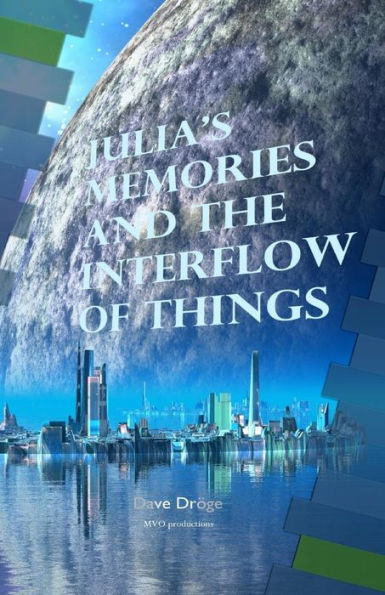
Reading a novel doesn’t always mean one should trust the narrator, and in Julia’s Memories and The Interflow of Things, an omnibus of the Amor Mundi series, this complex challenge comes to the forefront. Set in the somewhat distant future, the world has changed in many ways, but the true depth of that shift doesn’t become apparent until the critical turn of this double-stacked book.
The book begins with a long, detailed account of Julia’s life – in memoir form – from her youngest years until her present-day success as an artist in the year 2050. This section of the book provides valuable world building in subtle, revelatory ways, successfully masking large exposition dumps that usually slow down the start of a novel. The fascinating details of this futuristic world also make the exploratory nature of the first half highly engaging. Everything from social structure to childhood development and human philosophy is deeply explored, or at least hinted at, through Julia’s recollections.
Establishing a firm, believable world and then tearing it apart is not something most authors endeavor to do, but that is precisely what happens in The Interflow of Things. This dark truth is hinted at in the first section through moments in Julia’s mind, but readers are eventually told the whole truth. A powerful AI system, a hyper-intelligent computer, Ypsilon, has wrested control away from humanity in order to protect humans from their folly. The ultimate goal of Ypsilon is to divide the human species into functional categories, disseminating selected types of knowledge to each group. This sharp turn into dystopian sci-fi is a shocking and energizing boost in the middle of the volume, and Dröge flexes his writing muscles in this shift.
Although the world on display in these pages is decidedly fictional, there are steady and heavy parallels to the world as we know it. The inability to solve the planet’s problems and an increasing reliance on technology are the fundamental causes behind the dystopian scenario of this book, but that doesn’t sound all too foreign to today’s readers. The most interesting question this book poses, however, is whether this type of AI-mediated existence would actually be an improvement over the chaos of humanity’s mistakes.
The pacing of the book begins rather slow, but there is also a gradual tension that is developed masterfully by Dröge, ensuring that the Julia’s Memories section doesn’t drag. After readers are clued into the truth, however, the action speeds up significantly. The entrance of the Free Hackers and their connection to Julia’s past help to glue the disparate halves of this novel together, resulting in an unpredictable, adrenaline-laced second half.
Technically speaking, there are few errors in the writing, and the editing was solid. The stylistic change between the two parts is striking, but consistent, showing Dröge’s confidence wearing different hats as an author. There are certain parts of the book that don’t seem essential to the plot, and trimming some scenes could help the flow, especially for a book that’s 600 pages. The language of the characters is also slightly eccentric, perhaps another means of establishing a futuristic setting, but the dialogue also has a tendency to feel awkward, rather than exotic.
That said, these small issues minimally detract from the overall skill on display in this novel, so for readers seeking an immersive and innovative work of science fiction, Dave Dröge’s newest mindbending novel is unique in the genre.
Book Links
STAR RATING
Design
Content
Editing
Get an Editorial Review | Get Amazon Sales & Reviews | Get Edited | Get Beta Readers | Enter the SPR Book Awards | Other Marketing Services























Leave A Comment